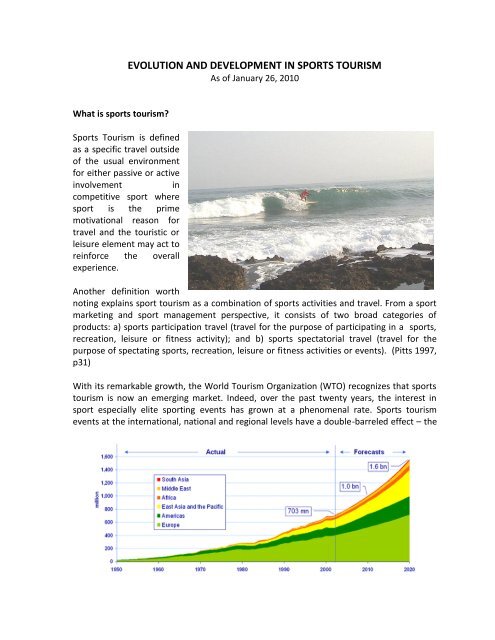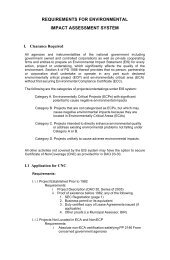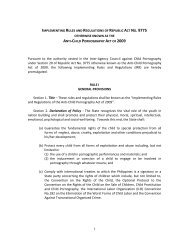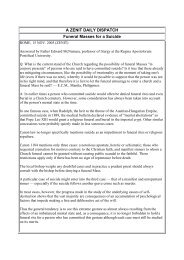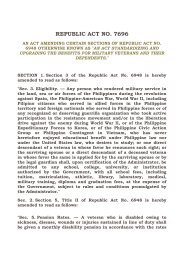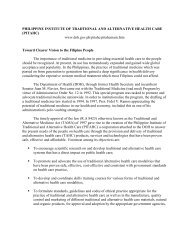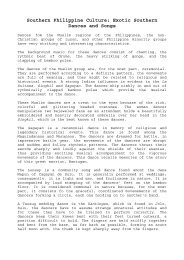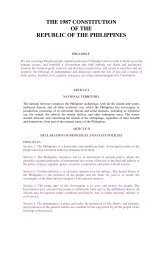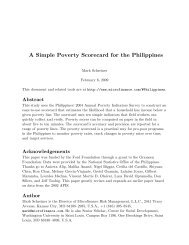evolution and development in sports tourism - It's More Fun in the ...
evolution and development in sports tourism - It's More Fun in the ...
evolution and development in sports tourism - It's More Fun in the ...
You also want an ePaper? Increase the reach of your titles
YUMPU automatically turns print PDFs into web optimized ePapers that Google loves.
EVOLUTION AND DEVELOPMENT IN SPORTS TOURISMAs of January 26, 2010What is <strong>sports</strong> <strong>tourism</strong>?Sports Tourism is def<strong>in</strong>edas a specific travel outsideof <strong>the</strong> usual environmentfor ei<strong>the</strong>r passive or active<strong>in</strong>volvement<strong>in</strong>competitive sport wheresport is <strong>the</strong> primemotivational reason fortravel <strong>and</strong> <strong>the</strong> touristic orleisure element may act tore<strong>in</strong>force <strong>the</strong> overallexperience.Ano<strong>the</strong>r def<strong>in</strong>ition worthnot<strong>in</strong>g expla<strong>in</strong>s sport <strong>tourism</strong> as a comb<strong>in</strong>ation of <strong>sports</strong> activities <strong>and</strong> travel. From a sportmarket<strong>in</strong>g <strong>and</strong> sport management perspective, it consists of two broad categories ofproducts: a) <strong>sports</strong> participation travel (travel for <strong>the</strong> purpose of participat<strong>in</strong>g <strong>in</strong> a <strong>sports</strong>,recreation, leisure or fitness activity); <strong>and</strong> b) <strong>sports</strong> spectatorial travel (travel for <strong>the</strong>purpose of spectat<strong>in</strong>g <strong>sports</strong>, recreation, leisure or fitness activities or events). (Pitts 1997,p31)With its remarkable growth, <strong>the</strong> World Tourism Organization (WTO) recognizes that <strong>sports</strong><strong>tourism</strong> is now an emerg<strong>in</strong>g market. Indeed, over <strong>the</strong> past twenty years, <strong>the</strong> <strong>in</strong>terest <strong>in</strong>sport especially elite sport<strong>in</strong>g events has grown at a phenomenal rate. Sports <strong>tourism</strong>events at <strong>the</strong> <strong>in</strong>ternational, national <strong>and</strong> regional levels have a double-barreled effect – <strong>the</strong>
Leap for <strong>the</strong> multi-billion dollar bus<strong>in</strong>ess <strong>in</strong> <strong>sports</strong> <strong>tourism</strong>Sports Tourism is a multi-billion dollar bus<strong>in</strong>ess, one of <strong>the</strong> fastest grow<strong>in</strong>g areas of <strong>the</strong> $4.5trillion global travel <strong>and</strong> <strong>tourism</strong> <strong>in</strong>dustry. It has become a vast <strong>in</strong>ternational bus<strong>in</strong>essattract<strong>in</strong>g media coverage, <strong>in</strong>vestment, political <strong>in</strong>terest, travel<strong>in</strong>g participants <strong>and</strong>spectators.By 2011, travel <strong>and</strong> <strong>tourism</strong> is expected to be more than 10 percent of <strong>the</strong> global domesticproduct. The economies of cities, regions <strong>and</strong> even countries around <strong>the</strong> world are<strong>in</strong>creas<strong>in</strong>gly reliant on <strong>the</strong> visit<strong>in</strong>g golfer <strong>and</strong> skier or <strong>the</strong> travel<strong>in</strong>g football, rugby or cricketsupporter. In some countries, sport can account for as much as 25 percent of all <strong>tourism</strong>receipts. Thus, Sports Tourism has started to earn its reputation to be a multi-million dollarbus<strong>in</strong>ess.Trends <strong>in</strong> <strong>tourism</strong> over <strong>the</strong> last decade have shown that <strong>sports</strong> <strong>tourism</strong> is emerg<strong>in</strong>g as a verysignificant segment of <strong>the</strong> global tourist market. While <strong>tourism</strong> <strong>in</strong>dustry <strong>in</strong> <strong>the</strong> Philipp<strong>in</strong>escont<strong>in</strong>ues to grow, a significant expansion <strong>in</strong> <strong>the</strong> worldwide <strong>sports</strong> <strong>and</strong> recreation <strong>in</strong>dustryhas also been felt. These <strong>in</strong>dustries come toge<strong>the</strong>r <strong>in</strong> <strong>the</strong> <strong>sports</strong> <strong>tourism</strong> sector <strong>and</strong> with <strong>the</strong>emergence of niche markets as a major factor <strong>in</strong> <strong>tourism</strong> <strong>development</strong>, <strong>the</strong> potential forgrowth <strong>in</strong> <strong>the</strong> sector is considerable.A unison of vision of two world organizations, WTO <strong>and</strong> IOCNo less than <strong>the</strong> World TourismOrganization (WTO) <strong>and</strong> <strong>the</strong>International Olympic Committee(IOC) recognize <strong>sports</strong> <strong>and</strong> <strong>tourism</strong>as liv<strong>in</strong>g forces for mutualunderst<strong>and</strong><strong>in</strong>g, culture <strong>and</strong><strong>development</strong> of society through acooperation agreement forged <strong>in</strong>2001. Through this, it jo<strong>in</strong>tlyasserts both <strong>in</strong>dustries as<strong>in</strong>terrelated <strong>and</strong> complementary<strong>and</strong> powerful forces for<strong>development</strong>, stimulat<strong>in</strong>g<strong>in</strong>vestment, susta<strong>in</strong>able economicgrowth, <strong>and</strong> fur<strong>the</strong>r creation ofemployment <strong>and</strong> generation of revenues.
The worldwide phenomenon <strong>in</strong> <strong>sports</strong> <strong>tourism</strong>To date, <strong>sports</strong> <strong>and</strong> active recreation have become very large <strong>and</strong> successful <strong>in</strong>dustriesworldwide. A 1994 European Commission Report of <strong>the</strong> European Community <strong>and</strong> Sportestimated that <strong>sports</strong> <strong>in</strong>dustry is responsible for 2.5 percent of world trade.Over <strong>the</strong> last 10 years, <strong>the</strong> global <strong>sports</strong> <strong>in</strong>dustry has seen rapid changes <strong>and</strong> <strong>in</strong>novationsfuelled by a range of driv<strong>in</strong>g factors such as <strong>the</strong> <strong>in</strong>crease <strong>in</strong> leisure time <strong>and</strong> spend<strong>in</strong>g, <strong>the</strong>appetite for spectacle <strong>and</strong> participation, new distribution methods <strong>and</strong> <strong>the</strong> deregulation of<strong>the</strong> broadcast <strong>in</strong>dustry. This resulted to travel worldwide ma<strong>in</strong>ly for <strong>sports</strong> purposes.Sports <strong>tourism</strong> is now a multi-billion dollar bus<strong>in</strong>ess - one of <strong>the</strong> fastest grow<strong>in</strong>g areas of <strong>the</strong>$4.5 trillion global travel <strong>and</strong> <strong>tourism</strong> <strong>in</strong>dustry. By 2011, travel <strong>and</strong> <strong>tourism</strong> is expected to bemore than ten (10) percent of <strong>the</strong> global domestic product. The economies of cities, regions<strong>and</strong> even countries around <strong>the</strong> world are <strong>in</strong>creas<strong>in</strong>gly reliant on <strong>the</strong> visit<strong>in</strong>g golfer <strong>and</strong> skieror <strong>the</strong> travel<strong>in</strong>g football, rugby or cricket supporter. In some countries, sport can accountfor as much as 25 percent of all <strong>tourism</strong> receipts.An analysis by The Bureau of Tourism Research recently published <strong>in</strong> Sports Tourism: anAustralian Perspective states that 6 percent of day trips <strong>and</strong> 5 per cent of overnight tripstaken by Australians <strong>in</strong> Australia, were taken with sport as <strong>the</strong> primary motivation. Thiscorresponds to expenditure of $1847 million by domestic <strong>sports</strong> tourists, of which $461million was spent on day trips <strong>and</strong> <strong>the</strong> rema<strong>in</strong><strong>in</strong>g $1386 million on overnight trips.In a separate study <strong>in</strong> Australia, <strong>sports</strong> <strong>tourism</strong> sector accounts for about 55% of <strong>the</strong> total<strong>tourism</strong> market. Across both <strong>in</strong>ternational <strong>and</strong> domestic <strong>tourism</strong>, <strong>sports</strong> <strong>tourism</strong> <strong>in</strong> Australiaaccount for annual expenditure of about $3 billion per annum.In 1998, 37% of Canada’s 73.7 million domestic trips were for <strong>sports</strong> <strong>tourism</strong> purposes. InCanada, sport tourists are def<strong>in</strong>ed as <strong>in</strong>dividuals who traveled <strong>and</strong> <strong>in</strong> do<strong>in</strong>g so participated<strong>in</strong> or attended a <strong>sports</strong> event dur<strong>in</strong>g <strong>the</strong> reference period. Sport tourists account forbetween 2.5 <strong>and</strong> 5 million <strong>in</strong>dividuals from June to September, July <strong>and</strong> August be<strong>in</strong>g <strong>the</strong>most popular months for sport tourist activities (15% <strong>and</strong> 18%). (Statistics Canada - 1998Canadian Travel Survey) (Note that this does not mean that 37% of <strong>tourism</strong> activity was<strong>sports</strong> <strong>tourism</strong> – ra<strong>the</strong>r which 37% of travelers traveled at least once for <strong>sports</strong> purposes).While sport <strong>tourism</strong> <strong>in</strong> South Africa is yet to be established, <strong>sports</strong> <strong>tourism</strong> (spectator <strong>and</strong>participant) makes up four percent (4%) of its domestic <strong>tourism</strong> market. This appearedfollow<strong>in</strong>g <strong>the</strong> launch<strong>in</strong>g of South Africa Sports Tourism (SAST) by <strong>the</strong> M<strong>in</strong>istry ofEnvironmental Affairs <strong>and</strong> Tourism, <strong>and</strong> <strong>the</strong> M<strong>in</strong>istry of Sport <strong>and</strong> Recreation <strong>in</strong> October1997, (Swart, 1998; St<strong>and</strong>even & DeKnop, 1999) after it specifically identified <strong>sports</strong> <strong>tourism</strong>as an avenue for <strong>the</strong> <strong>development</strong> <strong>and</strong> promotion of <strong>tourism</strong> <strong>in</strong> its study.
In <strong>the</strong> case of <strong>the</strong> United States of America, <strong>the</strong> Travel Industry Association of Americafound that <strong>in</strong> <strong>the</strong> past five years, 38 percent of US adults attended an organized event,competition or tournament as a spectator or participant, while on a trip of 50 miles ormore.The British Tourist Authority <strong>and</strong> English Tourism Board claim as many as 20 percent oftourist trips are for <strong>the</strong> prime purpose of <strong>sports</strong> participation, while up to 50 percent ofholidays <strong>in</strong>clude <strong>in</strong>cidental <strong>sports</strong> participation. This level of activity is broadly consistentwith Canadian data, with <strong>the</strong> 1998 Canadian Travel Survey f<strong>in</strong>d<strong>in</strong>g that 37% of domestictrips that year were for <strong>sports</strong>-related purposes.Based on <strong>the</strong> 2005 Annual Survey of Philipp<strong>in</strong>e Bus<strong>in</strong>ess Industry (ASPBI), sport<strong>in</strong>g <strong>and</strong> o<strong>the</strong>rrecreational establishments generated <strong>the</strong> highest revenue amount<strong>in</strong>g to Php44.7 billion or45.4 % of <strong>the</strong> total revenue.The challenge to go <strong>the</strong> distance <strong>in</strong> Philipp<strong>in</strong>e <strong>sports</strong> <strong>tourism</strong> is on …No less than Hong Kong-based Action Asia declares <strong>the</strong> Philipp<strong>in</strong>es as hav<strong>in</strong>g all <strong>the</strong><strong>in</strong>gredients to become one of <strong>the</strong> world’s great adventure travel dest<strong>in</strong>ations. ThePhilipp<strong>in</strong>e l<strong>and</strong>scape is a natural haven for adventure activities <strong>and</strong> <strong>sports</strong> <strong>tourism</strong>. Our7,107 isl<strong>and</strong>s boast <strong>and</strong> offer every imag<strong>in</strong>able way for adventure seekers. Yet, <strong>the</strong> countryis still an unknown quantity outside Asia.While <strong>the</strong> country has already started to realizethat <strong>sports</strong> <strong>tourism</strong> is one ideal avenue to spur<strong>tourism</strong> growth <strong>in</strong> <strong>the</strong> country, it has not yetdone its homework of develop<strong>in</strong>g <strong>the</strong> saidsector.As an <strong>in</strong>itial step to raise awareness on <strong>the</strong>opportunities sport <strong>tourism</strong> may br<strong>in</strong>g to <strong>the</strong>country, <strong>the</strong> Philipp<strong>in</strong>e Convention <strong>and</strong> VisitorsCorporation (PCVC), supported by <strong>the</strong>Philipp<strong>in</strong>e Olympic Committee (POC) <strong>and</strong>Philipp<strong>in</strong>e Sports Commission (PSC) <strong>and</strong>participated <strong>in</strong> by <strong>the</strong> country’s <strong>sports</strong> <strong>and</strong>travel trade suppliers organized <strong>in</strong> November7-30, 2003 <strong>the</strong> 1 st Sports Tourism <strong>and</strong>Adventure Travel Show. Never<strong>the</strong>less, noconcrete plan or follow-up has been done to susta<strong>in</strong> its <strong>development</strong> ma<strong>in</strong>ly due to lack off<strong>in</strong>ancial support.
The Philipp<strong>in</strong>e Department of Tourism (DOT), which is <strong>the</strong> country’s lead agency tasked todevelop <strong>the</strong> <strong>tourism</strong> <strong>in</strong>dustry <strong>in</strong> <strong>the</strong> Philipp<strong>in</strong>es, has nei<strong>the</strong>r <strong>the</strong> policy nor operational<strong>in</strong>fluence over <strong>the</strong> policies or programs of <strong>the</strong> <strong>sports</strong> <strong>in</strong>dustry be<strong>in</strong>g adm<strong>in</strong>istered by <strong>the</strong>Philipp<strong>in</strong>e Sports Commission (PSC), much less <strong>the</strong> Philipp<strong>in</strong>e Olympic Committee (POC), anautonomous entity that sanctions <strong>the</strong> country’s participation <strong>in</strong> <strong>in</strong>ternational competitions.The Philipp<strong>in</strong>es has played host to a number of <strong>in</strong>ternational sport<strong>in</strong>g events. Sadly, <strong>sports</strong><strong>tourism</strong> opportunities, <strong>and</strong> especially <strong>the</strong> <strong>tourism</strong> benefits, are sometimes lost or notmaximized <strong>in</strong> all <strong>the</strong>se hosted events because <strong>the</strong> l<strong>in</strong>kages between <strong>the</strong> <strong>sports</strong> <strong>and</strong> <strong>tourism</strong>sectors are not yet established. Sport<strong>in</strong>g activities, especially events, have historically beenorganized by sport<strong>in</strong>g organizations for purely sport<strong>in</strong>g purposes. Maximiz<strong>in</strong>g <strong>the</strong> <strong>tourism</strong>potential of <strong>the</strong> events has often not been a major consideration for <strong>the</strong> organizers,represent<strong>in</strong>g a potential failure of <strong>the</strong> market. Fur<strong>the</strong>r, many sport<strong>in</strong>g organizations rely onvolunteers, <strong>and</strong> may not have well developed bus<strong>in</strong>ess or organizational skills orexperience. Both of <strong>the</strong>se factors can lead to lost <strong>tourism</strong> opportunities. To overcome this,better l<strong>in</strong>kages need to be established between <strong>the</strong> sport<strong>in</strong>g <strong>and</strong> <strong>tourism</strong> groups at all levels– regional <strong>and</strong> national.Senator Richard Gordon, former <strong>tourism</strong> secretary, has seen <strong>the</strong> need to streng<strong>the</strong>n thissector. In his proposed bill, SB 1834, entitled “An Act Declar<strong>in</strong>g <strong>and</strong> Implement<strong>in</strong>g a NationalPolicy for Tourism as <strong>the</strong> Primary Eng<strong>in</strong>e of Investment, Employment, Growth <strong>and</strong> NationalDevelopment, And Provid<strong>in</strong>g Necessary Incentives Therefore,” <strong>the</strong> realignment of <strong>the</strong>Philipp<strong>in</strong>e Sports Commission under <strong>the</strong> Department of Tourism is proposed. It underscores<strong>the</strong> importance of <strong>sports</strong> competition <strong>in</strong> promot<strong>in</strong>g <strong>tourism</strong>.Like many niche <strong>tourism</strong> sectors, <strong>the</strong> <strong>sports</strong> <strong>tourism</strong> sector suffers from a lack of reliabledata on which to base strategic decision-mak<strong>in</strong>g. Even data, which might help measure <strong>the</strong>size of <strong>the</strong> sector, is not readily available. The Arrival/Departure Survey Card, a research toolused by <strong>the</strong> Department of Tourism <strong>in</strong> ascerta<strong>in</strong><strong>in</strong>g arrivals <strong>and</strong> factors associated to<strong>tourism</strong> for its decision-mak<strong>in</strong>g, does not still consider <strong>sports</strong> <strong>in</strong> its checklist. Thus far, <strong>the</strong>country has no exist<strong>in</strong>g data on <strong>the</strong> extent or magnitude of <strong>the</strong> <strong>sports</strong> <strong>tourism</strong> <strong>and</strong> <strong>the</strong>economic impact it br<strong>in</strong>gs. Even <strong>the</strong> Philipp<strong>in</strong>e Sports Commission has no data on <strong>the</strong> extentof <strong>the</strong> <strong>sports</strong> <strong>in</strong>dustry, how many it employs <strong>and</strong> how much it contributes to <strong>the</strong> economy.Certa<strong>in</strong>ly, <strong>the</strong>re are still a lot of issues <strong>and</strong> impediments which need to be addressed,namely: coord<strong>in</strong>ation of <strong>the</strong> <strong>sports</strong> <strong>tourism</strong> <strong>in</strong>dustry, education <strong>and</strong> tra<strong>in</strong><strong>in</strong>g, regulatoryissues (e.g. visas, customs) on <strong>the</strong> <strong>in</strong>dustry, <strong>in</strong>frastructure requirements of <strong>the</strong> <strong>in</strong>dustry,research <strong>and</strong> data collection requirements <strong>and</strong> evaluation of <strong>the</strong> economic benefits of<strong>sports</strong> <strong>tourism</strong>.
The Philipp<strong>in</strong>es, by all means, can do so much <strong>in</strong> terms of develop<strong>in</strong>g <strong>the</strong> said market.Concrete mechanisms are yet to be <strong>in</strong>stitutionalized to maximize <strong>the</strong> <strong>sports</strong> <strong>tourism</strong> market.While o<strong>the</strong>r countries have started <strong>and</strong> <strong>in</strong> <strong>the</strong> process of develop<strong>in</strong>g strategies for <strong>the</strong>irrespective <strong>sports</strong> <strong>tourism</strong> <strong>in</strong>dustry, <strong>the</strong> country is still at a st<strong>and</strong>still <strong>in</strong> one niche marketwhere we have all <strong>the</strong> potentials to compete. After all, <strong>the</strong> <strong>tourism</strong> <strong>in</strong>dustry is more thanjust dest<strong>in</strong>ations but <strong>in</strong>novative market<strong>in</strong>g as well.Recognizes <strong>sports</strong> <strong>tourism</strong> as a catalyst for growth <strong>in</strong> <strong>the</strong> Philipp<strong>in</strong>esThe Philipp<strong>in</strong>e government, under <strong>the</strong> adm<strong>in</strong>istration of President Gloria Macapagal-Arroyo,firmly recognizes <strong>and</strong> establishes <strong>the</strong> importance of <strong>sports</strong> <strong>tourism</strong> as a catalyst for growth.On <strong>the</strong> o<strong>the</strong>r h<strong>and</strong>, <strong>sports</strong> have always been an <strong>in</strong>tegral part of <strong>the</strong> nation’s life <strong>and</strong> it is<strong>in</strong>creas<strong>in</strong>gly be<strong>in</strong>g recognized that sport<strong>in</strong>g events <strong>and</strong> activities have <strong>the</strong> potential to be amajor <strong>tourism</strong> draw card.In October 2009, President Arroyo posed a challenge to <strong>the</strong> DOT <strong>and</strong> to both <strong>the</strong> <strong>sports</strong> <strong>and</strong><strong>tourism</strong> sectors to cont<strong>in</strong>ue maximiz<strong>in</strong>g efforts <strong>and</strong> resources of an archipelagic country like<strong>the</strong> Philipp<strong>in</strong>es to go <strong>the</strong> distance. A complete message sent to <strong>the</strong> DOT is read as follows:“In 2001, <strong>the</strong> world has f<strong>in</strong>ally opened access to previously restrictedopportunities <strong>in</strong> <strong>sports</strong> <strong>and</strong> <strong>tourism</strong> when <strong>the</strong> World Health Organization(WHO) <strong>and</strong> <strong>the</strong> International Olympic Committee (IOC) hosted a major<strong>in</strong>ternational conference <strong>in</strong> Barcelona, Spa<strong>in</strong> to def<strong>in</strong>e <strong>the</strong> <strong>development</strong>issues <strong>and</strong> challenges faced by <strong>the</strong> fusion of <strong>sports</strong> <strong>and</strong> <strong>tourism</strong>.This global breakthrough has <strong>in</strong>spired <strong>the</strong> Department of Tourism to launch<strong>sports</strong> <strong>tourism</strong> <strong>in</strong> <strong>the</strong> Philipp<strong>in</strong>es <strong>in</strong> 2002. A 3-week celebration through <strong>the</strong>1 st Sports <strong>and</strong> Adventure Travel Show held at <strong>the</strong> Intramuros Clamshellsignaled <strong>the</strong> packag<strong>in</strong>g <strong>and</strong> promotion of <strong>the</strong> Philipp<strong>in</strong>es as a one-stopaction-dest<strong>in</strong>ation.Play Philipp<strong>in</strong>es!From <strong>the</strong>n on, <strong>the</strong> Department of Tourism <strong>in</strong>itiated a number of programs<strong>and</strong> activities to cater to a strong tourist dem<strong>and</strong> for <strong>sports</strong> experiences.Indeed, <strong>the</strong>re are now a high number of travelers seek<strong>in</strong>g active <strong>and</strong>passive <strong>in</strong>volvement <strong>in</strong> <strong>sports</strong>.The exp<strong>and</strong><strong>in</strong>g dem<strong>and</strong> to cater to this phenomenon is now a challengethat <strong>the</strong> Department of Tourism has to seriously consider.With <strong>the</strong> magnificent topography of Philipp<strong>in</strong>e archipelago, <strong>the</strong>re is noreason “Play Philipp<strong>in</strong>es!” will not go <strong>the</strong> distance on a global scale.”
<strong>More</strong> tasks are yet to be done <strong>in</strong> Philipp<strong>in</strong>e <strong>sports</strong> <strong>tourism</strong> <strong>development</strong>As it is, however, <strong>the</strong>re appears to be not enough effort between <strong>the</strong> <strong>sports</strong> sector/<strong>in</strong>dustry<strong>and</strong> <strong>the</strong> <strong>tourism</strong> sector/<strong>in</strong>dustry that might lead to significant <strong>development</strong> <strong>and</strong> mergenceof <strong>the</strong> <strong>sports</strong> <strong>tourism</strong> sector. For all practical purposes, significant relationship between<strong>sports</strong> <strong>and</strong> <strong>tourism</strong> is yet to be established at ei<strong>the</strong>r <strong>the</strong> policy or operational level.Impact of Sports Tourism <strong>in</strong> <strong>the</strong> Philipp<strong>in</strong>esBoth <strong>the</strong> <strong>tourism</strong> <strong>and</strong> <strong>sports</strong> <strong>in</strong>dustries have recognized <strong>sports</strong> <strong>tourism</strong> as a catalyst foreconomic <strong>and</strong> <strong>tourism</strong> growth. It can play a crucial role <strong>in</strong>:1. Mak<strong>in</strong>g known to people worldwide <strong>and</strong> nationwide that <strong>the</strong> Philipp<strong>in</strong>es have an arrayof magnificent isl<strong>and</strong>s with breathtak<strong>in</strong>g l<strong>and</strong>scapes <strong>and</strong> wonderful terra<strong>in</strong>s that are veryconducive to <strong>sports</strong>, adventure <strong>and</strong> recreational activities. That, <strong>in</strong> <strong>the</strong> Philipp<strong>in</strong>es, <strong>the</strong>y can:‣ Learn diverse k<strong>in</strong>ds of <strong>sports</strong>‣ Play <strong>and</strong> experience <strong>sports</strong> for recreation <strong>and</strong> leisure‣ Host high-level <strong>sports</strong> tournaments‣ Organize friendly games‣ Hold <strong>sports</strong> <strong>and</strong> adventure boot camps‣ Conduct <strong>sports</strong> conference <strong>and</strong> o<strong>the</strong>r educational ga<strong>the</strong>r<strong>in</strong>gs‣ Advance <strong>sports</strong> professional <strong>and</strong> academic competencies2. Persuad<strong>in</strong>g visitors to travel to a particular dest<strong>in</strong>ation;3. Stimulat<strong>in</strong>g visitation at particular times of <strong>the</strong> year;4. Encourag<strong>in</strong>g visitors to stay longer;5. Facilitat<strong>in</strong>g repeat visitation;6. Generat<strong>in</strong>g media coverage <strong>and</strong> promotional opportunities for a dest<strong>in</strong>ation; <strong>and</strong>7. Broaden<strong>in</strong>g perceptions of a dest<strong>in</strong>ation.


